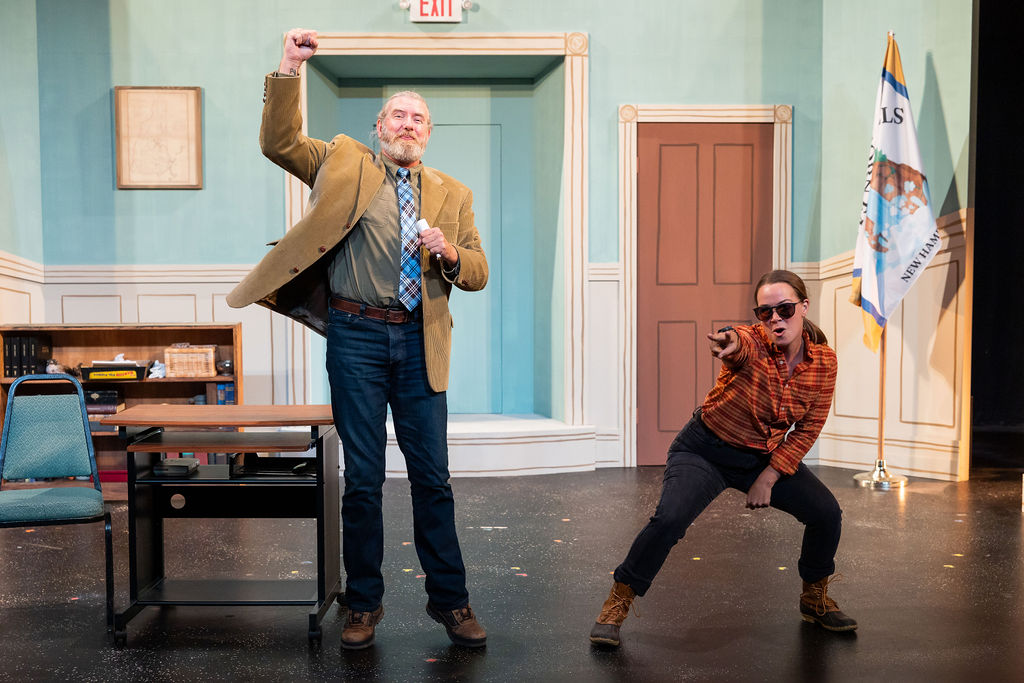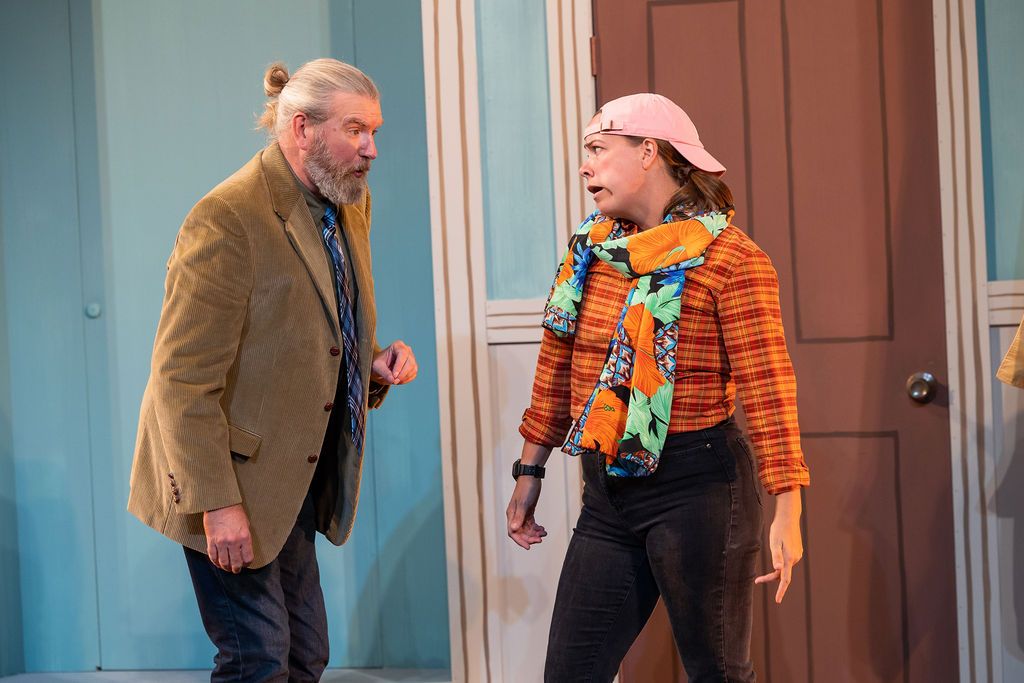
‘Popcorn Falls’ – Written by James Hindman. Directed by Lisa Rafferty. Scenic Design by Kristin Loeffler, Lighting Design by Elmer Martinez, Costume Design by Deirdre Gerrard, Sound Design by Caroline Eng, Properties Design by Sarajane Mullins. Presented by Greater Boston Stage Company, 395 Main St., Stoneham, through October 2.
by Linda Chin
Like eating popcorn on the couch with an old friend, Greater Boston Stage Company’s production of Popcorn Falls fills that craving for comfort food that many people have had since the pandemic began – for the feelings of nostalgia, or belonging, that a familiar family recipe evokes. The play’s title Popcorn Falls refers to both the name of a small town where the story takes place, and its namesake waterfall which provides a source of drinking water and an income stream from tourism. At the top of the show we are introduced to the town’s newest resident, Mayor Trundle (Christopher Chew) and long-term resident/town clerk, Joe (Sarah Elizabeth Bedard) who are anxiously preparing for a community meeting to discuss a most urgent situation: the town is nearly bankrupt.

Like in the musical Urinetown, the citizens of Popcorn Falls are experiencing a serious water shortage and are at the mercy of a scheming, money-hungry, corrupt official, Head of the Cattaraugus County Budget Planning Committee Mr. Doyle (Bedard). Not only did Doyle build the dam that caused the waterfall to dry up and harmed the townspeople in the first place, but he announces his plans to convert the distressed town into a sewage treatment plant. The only way to possibly save Popcorn Falls from turning into Schitt’s Creek is to access funds that have been earmarked in the county budget for the arts, namely a theater. Doyle gives them exactly one week to build a theater and put on a play, and the countdown begins.
This two-actor, one-act play is true to its billing as a fun, feel-good show. The dialogue in Popcorn Falls is mostly fluffy, and some of Hindman’s writing is pun-ny (the townsfolk like to be referred to as “colonels/kernels” and teacher Mrs. Stepp’s maiden name was Guided), and for those theater nerds among us, there are references to other plays and musicals sprinkled throughout. The conversation and physical action take place at a brisk pace, and Chew and Bedard’s portrayals of about 20 different characters in total are executed with exquisite skill and timing. Chew plays Mayor Trundle for most of play, with a few other cameos sprinkled in: the energetic Fred Astaire and Ginger Rogers-obsessed funeral director Hans and Mr. Doyle’s blatantly bored secretary Miss Brown. Bedard does most of the heavy lifting in terms of the number and range of characters she plays including the evil Doyle, Trundle’s love interest Becky, the lumberyard owner, theatrical town librarian, self-absorbed teenager Margie, a flirtatious teacher, and Becky’s young daughter Lydia. The one moment when Trundle (Chew) and Becky (Batard) are scene partners and then reverse roles was particularly creative and delightful.

Popcorn Falls is at its best when it is simple and light-hearted. One can’t help but marvel at Chew and Bedard’s talents in adapting their voice and speech, body movement, and props/costume elements that are real (stuffed cat, boa, sunglasses, apron) or “invisible” (monocle, nail file, cigarette) to portray the characters. They also provide sound effects to great effect (e.g. the whoosh of dispensing carbonated drinks). In contrast, when the dialogue gets heavy-handed or lapses into sentimentality, the play is less compelling. The main set, a life-sized, high-ceilinged, municipal building of great stature, complete with metal letter signage spelling out P-O-P-C-O-R-N F-A-L-L-S is beautifully designed (byKristin Loeffler), constructed, and painted, but seems more solid and realistic (and costly?) than necessary for this fanciful and fluid play. While playwright Hindman has infused Popcorn Falls with messages (e.g. the power of corrupt leaders and greed to destroy, and the power of art – specifically theater – to save lives and communities), director Lisa Rafferty and team have created a production that doesn’t weigh you down or force feed you, but makes you laugh, fills your heart and lifts you up. For tickets and information, go to: https://www.greaterbostonstage.org/

